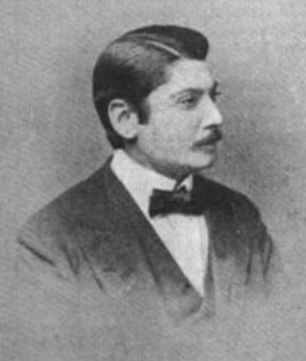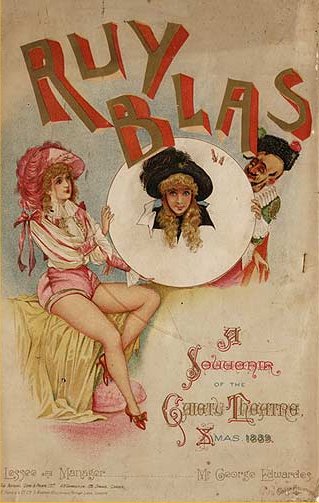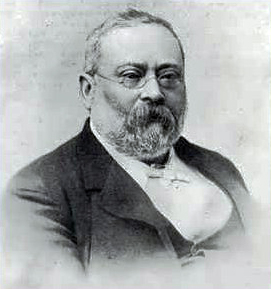
Frederick George Hobson, known as Fred Leslie, was an English actor, singer, comedian and dramatist.

George Joseph Edwardes was an English theatre manager and producer of Irish ancestry who brought a new era in musical theatre to the British stage and beyond.

The Gaiety Theatre was a West End theatre in London, located on Aldwych at the eastern end of the Strand. The theatre was first established as the Strand Musick Hall in 1864 on the former site of the Lyceum Theatre. In 1868, it became known as the Gaiety Theatre and was, at first, known for music hall and then for musical burlesque, pantomime and operetta performances. From 1868 to the 1890s, it had a major influence on the development of modern musical comedy.

James Tolman Tanner was an English stage director and dramatist who wrote many of the successful musicals produced by George Edwardes.

Victorian burlesque, sometimes known as travesty or extravaganza, is a genre of theatrical entertainment that was popular in Victorian England and in the New York theatre of the mid-19th century. It is a form of parody in which a well-known opera or piece of classical theatre or ballet is adapted into a broad comic play, usually a musical play, usually risqué in style, mocking the theatrical and musical conventions and styles of the original work, and often quoting or pastiching text or music from the original work. Victorian burlesque is one of several forms of burlesque.

Ruy Blas and the Blasé Roué is a burlesque written by A. C. Torr and Herbert F. Clark with music by Meyer Lutz. It is based on the Victor Hugo drama Ruy Blas. The piece was produced by George Edwardes. As with many of the Gaiety burlesques, the title is a pun.

Cinder Ellen up too Late is a musical burlesque written by Frederick Hobson Leslie and W. T. Vincent, with music arranged by Meyer Lutz from compositions by Lionel Monckton, Sidney Jones, Walter Slaughter, Osmond Carr, Scott Gatti, Jacobi, Robertson, and Leopold Wenzel. Additional lyrics were written by Basil Hood. The show was a burlesque of the well-known pantomime and fairy tale, Cinderella.

Wilhelm Meyer Lutz was a German-born British composer and conductor who is best known for light music, musical theatre and burlesques of well-known works.

Marion Hood was an English soprano who performed in opera and musical theatre in the last decades of the 19th century. She is perhaps best remembered for creating the role of Mabel in Gilbert and Sullivan's The Pirates of Penzance in London.

Galatea, or Pygmalion Re-Versed is a musical burlesque that parodies the Pygmalion legend, and specifically W. S. Gilbert's 1871 play Pygmalion and Galatea. The libretto was written by Henry Pottinger Stephens and W. Webster. The score was composed by Wilhelm Meyer Lutz.

Faust up to Date is a musical burlesque with a libretto was written by G. R. Sims and Henry Pettitt, and a score written by Meyer Lutz. Set in Nuremberg, it is a spoof of Gounod's opera, Faust, which had first been performed in London in 1864. The burlesque followed on from an earlier Lutz musical, Mephistopheles, or Faust and Marguerite.

Ellen "Nellie" Farren was an English actress and singer best known for her roles as the "principal boy" in musical burlesques at the Gaiety Theatre in London.

John Hollingshead was an English theatrical impresario, journalist and writer during the latter half of the 19th century. After a journalism career, Hollingshead managed the Alhambra Theatre and was later the first manager of the Gaiety Theatre, London. Hollingshead also wrote several books during his life.

Little Jack Sheppard is a burlesque melodrama written by Henry Pottinger Stephens and William Yardley, with music by Meyer Lutz, with songs contributed by Florian Pascal, Corney Grain, Arthur Cecil, Michael Watson, Henry J. Leslie, Alfred Cellier and Hamilton Clarke. The comedy lampooned the serious plays based on the life of Jack Sheppard, especially the popular 1839 play by John Buckstone, which was in turn based on the novel of that year by William Harrison Ainsworth.

The Forty Thieves is a "Pantomime Burlesque" written by Robert Reece, W. S. Gilbert, F. C. Burnand and Henry J. Byron, created in 1878 as a charity benefit, produced by the Beefsteak Club of London. The Beefsteak Club still meets in Irving Street, London. It was founded by actor John Lawrence Toole and others in 1876, in rooms above the Folly Theatre, King William IV Street. It became an essential after theatre club for the bohemian theatre set, such as Henry Irving, Toole, John Hare, W. H. Kendal, F. C. Burnand, Henry Labouchère, W. S. Gilbert and two hundred of their peers. It soon moved to Green Street. The Club occasionally performed amateur plays for their own amusement and to raise funds for charities.

Carmen up to Data is a musical burlesque with a score written by Meyer Lutz. Set in Seville, the piece was a spoof of Bizet's 1875 opera Carmen. The libretto was written by G. R. Sims and Henry Pettitt.

Frederick John D'Auban was an English dancer, choreographer and actor of the Victorian and Edwardian eras. Famous during his lifetime as the ballet-master at the Theatre Royal, Drury Lane, he is best remembered as the choreographer of many of the Gilbert and Sullivan operas.
Miss Esmeralda is a Victorian burlesque, in two acts, with music by Meyer Lutz and Robert Martin and a libretto by Fred Leslie, under his pseudonym "A. C. Torr", and Horace Mills. It is based on Victor Hugo's novel Notre Dame de Paris.

Monte Cristo Jr. was a Victorian burlesque with a libretto written by Richard Henry, a pseudonym for the writers Richard Butler and Henry Chance Newton. The score was composed by Meyer Lutz, Ivan Caryll, Hamilton Clarke, Tito Mattei, G. W. Hunt and Henry J. Leslie. The ballet and incidental dances were arranged by John D'Auban, and the theatre's musical director, Meyer Lutz, conducted. The play's doggerel verse was loosely based on The Count of Monte Cristo by Alexandre Dumas.

The Bohemian G-yurl and the Unapproachable Pole is a musical burlesque in two acts, with a score by Meyer Lutz to a libretto by Henry James Byron, which played under the management of John Hollingshead at the Gaiety Theatre in London in 1877. It was a parody of the popular opera The Bohemian Girl composed by Michael William Balfe with a libretto by Alfred Bunn.


















